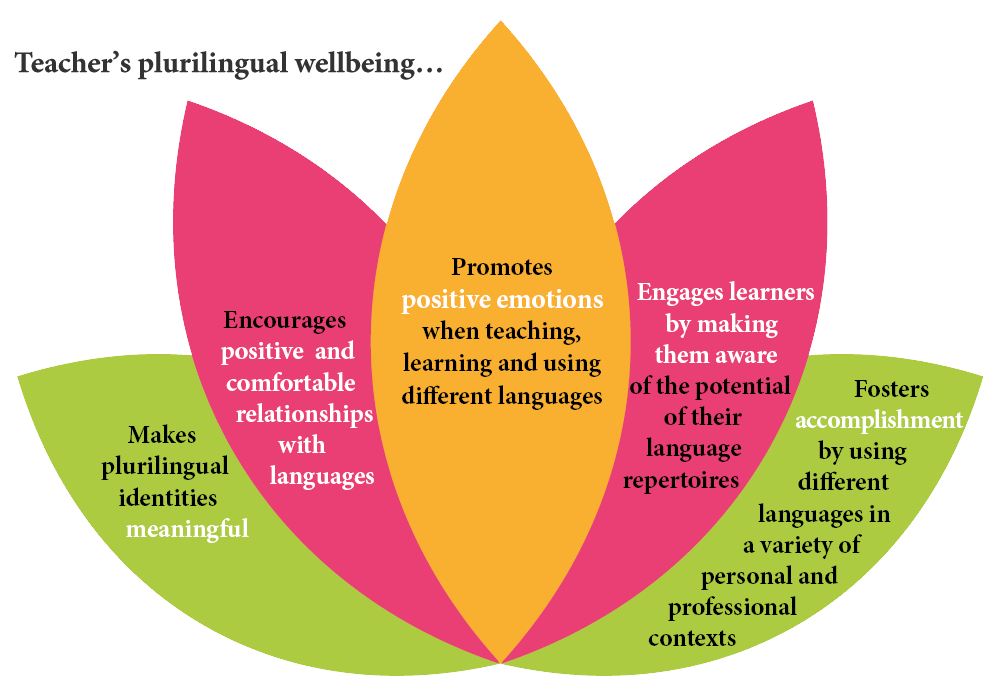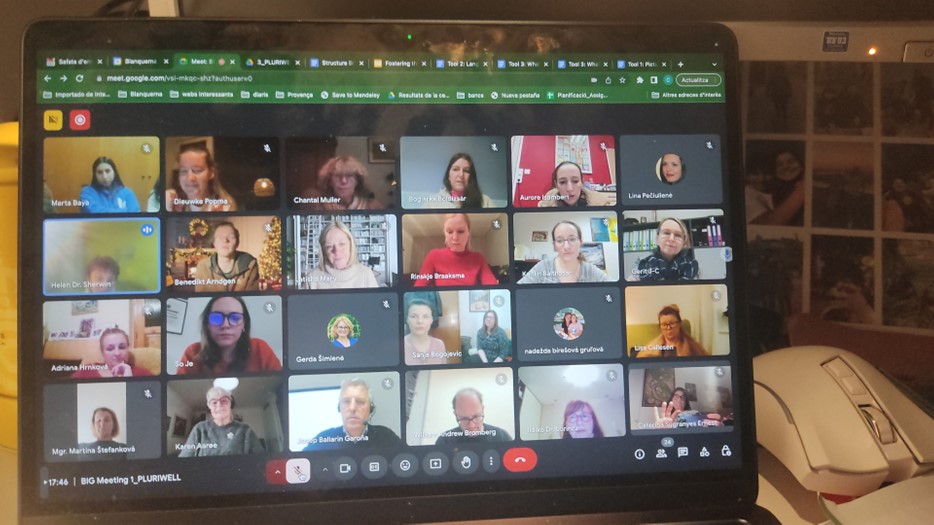Latest news
20.03.2025
Pluriwell teachers exchange tips and refine tools for plurilingual wellbeing
On 10 March 2025, teachers and language teaching experts from around Europe once again met within the framework of the ECML project Pluriwell. The online gathering was a chance to share the work they have been doing with their local colleagues with the broader Pluriwell community, and to exchange feedback, tips and best practices for creating tools for teachers’ plurilingual wellbeing.
Over 20 participants from countries as far afield as Spain, The Netherlands, Switzerland, Montenegro, France, Slovakia, Hungary and Denmark spent an intensive two hours online, a clear indication of their continued dedication to the project and to helping their colleagues around Europe improve their relationships with languages and plurilingualism. The meeting kicked off with an update from the Pluriwell expert team but most of the time was devoted to the sharing and analysis of the plurilingual wellbeing tools that the participating teachers have been creating over the past few months.
“The small group breakout room sessions were a great chance for the participants to really showcase what they have been doing,” said Pluriwell communications officer Karen Aarøe. “We on the expert team were really satisfied with the quality and variety of the tools that were presented, and we were really pleased with the creativity of our teachers,” she added. Some of the tools discussed included card games with plurilingual challenges, language maps and other visual representations, activities based on storytelling, and a plurilingual identity Lego workshop.
In the coming months, the tools will be assessed by the expert team, and a selection of tools will be compiled and published. “It’s really great to see how the tools are growing and improving,” said Swiss primary school teacher Ingo König. “I'm really excited to see what kind of collection will come out of this,” he added.
Beyond the individual tools, the meeting also offered an opportunity to share more general reflections. For example, several participants agreed that, while Pluriwell tools are designed for teachers, many of the activities and ideas that were shared at the meeting would also be more than suitable for use with students from a variety of age groups. “Some tools could even be used by students and teachers together,” observed project website correspondent Latisha Mary.
Caterina Sugranyes (project coordinator), Karen Aarøe, Gerit Jaritz, Latisha Mary, and Associate partners Josep Ballarin, Kaitlin Balthasar, Will Bromberg
- ECML project website “Fostering the plurilingual wellbeing of language teachers” (2024-26) (available in English and French) : www.ecml.at/pluriwell

10.03.2025
Pluriwell teachers on the pathway to plurilingual wellbeing
The participants in the ECML’s “Fostering the plurilingual wellbeing of language teachers” project (Pluriwell) are continuing to do inspiring work in their respective schools and countries. In the current phase of the project, teachers are collaborating with their colleagues locally to create tools to foster plurilingual wellbeing. Some are already piloting the tools in their schools. A selection of their output will be included in a forthcoming toolkit for teachers.
Participants in the countries and schools in the Pluriwell network have been applying the conceptual framework of plurilingual wellbeing and the project’s guidelines as they work to create tools for teachers. Some of the resulting tools are already being incorporated into teacher training activities at the schools in the network and beyond. The upcoming online Pluriwell meeting in March will be an opportunity for these local teams to share their progress, get feedback and submit tools for the final toolkit.
Teachers are creating tools both in their local languages and in the main languages of the project, English and French. The tools in other languages will be translated by the team members. While some tools may address issues that are specific to certain linguistic contexts, most will have a broader appeal and will be applicable around Europe. “This project is about helping teachers become more aware of their own relationships to the languages around them”, said the project’s second language correspondent Gerit Jaritz. “Of course, the linguistic situations of the schools involved can vary greatly, but we all have reflections that can be helpful elsewhere.”
Escola Lurdes in Barcelona is a leading example of a Pluriwell school. The four participating teachers there have already designed and shared six tools, addressing various aspects of plurilingual wellbeing. Thank you Marta Bayà, Maria Guerra, Estel Torruella and Mar Fernández! “The project website is an important place for us to share our work in progress,” according to Pluriwell’s website correspondent, Latisha Mary. For more information on these tools, please see the upcoming updates in our section on Recent Developments.
The Pluriwell expert team has developed an instrument to assess the effectiveness of the contributions. This will allow them to determine which tools to include in the ECML toolkit. The online meeting in March and the assessment tool will be featured in the next news item here. Our communications officer Karen Aarøe will also be sharing the ways in which we are disseminating our project.
Caterina Sugranyes (project coordinator), Latisha Mary, Gerit Jaritz, Karen Aarøe
24.01.2025
Pluriwell online meeting brings together 30 participants from across Europe

As the first full year of the ECML project Pluriwell came to a close, the participants held an online meeting to continue their collaboration, share their ideas and celebrate their progress. Over 30 participants from all over Europe joined the event via video chat on 16 December 2024. The meeting was an opportunity for Pluriwell teachers to reconnect, look back at what the network has accomplished in 2024 and look ahead to the coming year.
Pluriwell teachers around Europe have been collaborating with a view to creating tools designed to increase teachers’ plurilingual wellbeing. The meeting offered a space for participants to compare notes about this work in progress. Teachers were able to exchange impressions about how their colleagues and schools have responded to Pluriwell’s ideas about plurilingual wellbeing and to compare the issues that have emerged as they have explored their colleagues’ experiences and attitudes in different contexts.
The fact that the meeting attracted such a large number of attendees from the participating schools reflects the continued strength of the project network as Pluriwell enters its second year and a new phase of work on the plurilingual wellbeing of teachers. Many of the attendees had already attended the initial network meeting in Graz in October, and were joined by colleagues who have been taking part in Pluriwell remotely. Attendees connected from several countries including Spain, France, Switzerland, Denmark, the Netherlands, Lithuania, Hungary, Slovakia, Montenegro and Czechia.
Caterina Sugranyes (project coordinator), Latisha Mary, Gerit Jaritz, Karen Aarøe
